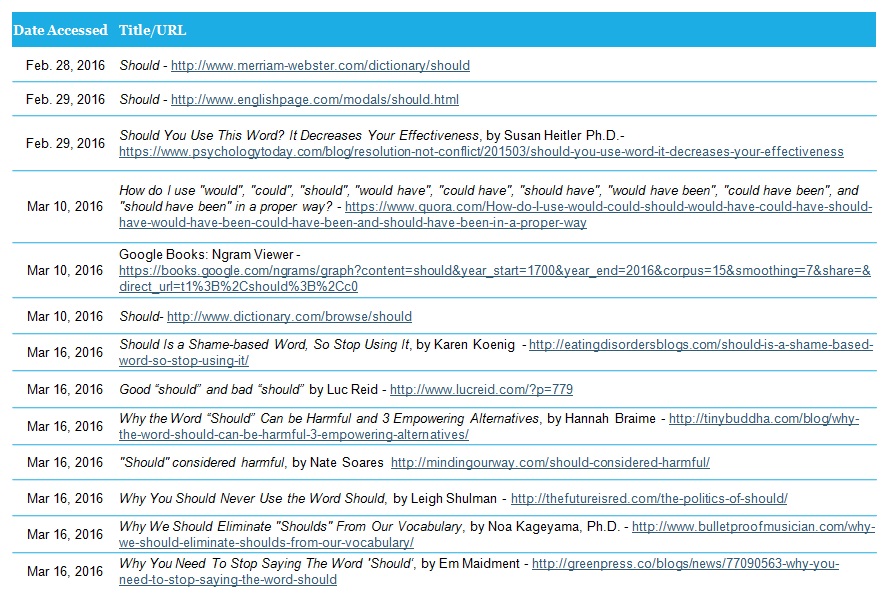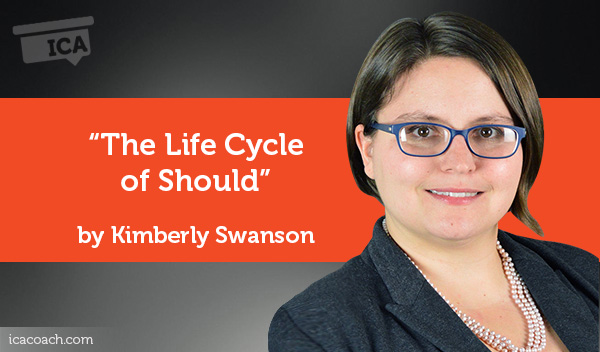
Research Paper By Kimberly Swanson
(Life Coach, UNITED STATES)
How Should Influences Our Lives and Manifests in Coaching
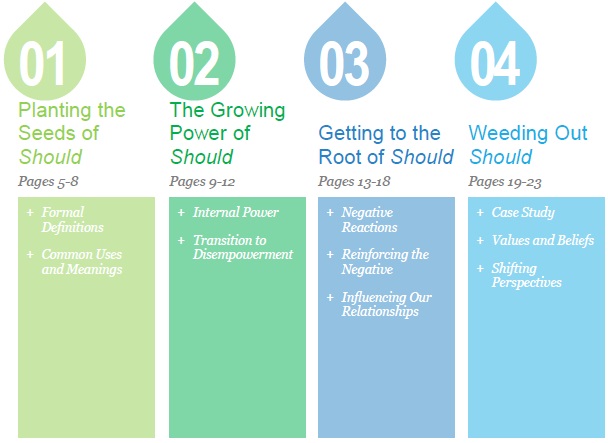
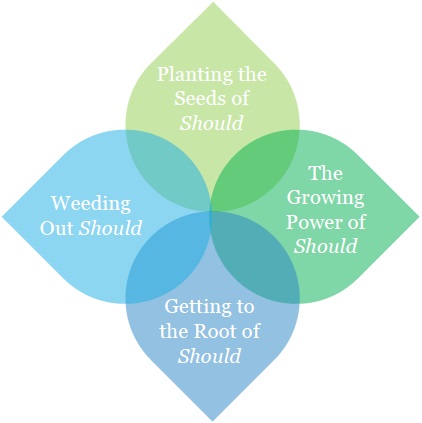 No matter the topic or issue raised during a coaching session, the idea of should is often present.
No matter the topic or issue raised during a coaching session, the idea of should is often present.
Whether it is inner dialogue, or other’s placing their shoulds onto us, the word can have a powerful impact on our lives. When misaligned with your values and beliefs, the impact can be devastating.
Why it shows up in coaching?
Should takes away choices and can leave us feeling stuck.
Many times it is this stuck-ness that leads people to coaching.
With its focus on the present and future, coaching is uniquely positioned to shift the power of should.
It is also inside the coaching partnership that we can vocalize the internal shoulds we have been telling ourselves, often times for years.
The shoulds we place upon ourselves are deeply rooted in our underlying beliefs.
There are judgements and expectations tied to every use of should.
We allow these shoulds to disempower us; giving in to the harmful and negative feelings. These feelings impact every area of our lives and can be a catalyst for seeking a coach.
01 Planting the Seeds of Should
+Formal Definitions
+Common Uses and Meanings
Should is most commonly used to make recommendations or give advice. It can also be used to express obligation as well as expectation. Englishpage.com
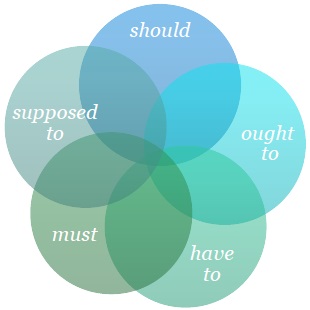 Formal Definitions
Formal Definitions
The formal definitions of should state it can be used to express conditions, obligations, propriety, expediency, probabilities, expectations, to request in a polite manner, or to soften a direct statement.
Although should is the past tense of shall, as a modal verb it can be used in past, present, and future tenses. Some variations of should are ought to and supposed to.
The use of have to or must may trigger similar reactions as the use of should.
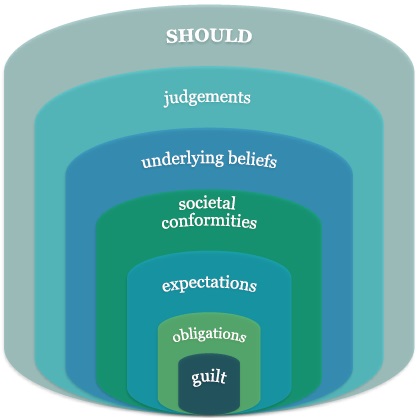 Common Uses and Meanings
Common Uses and Meanings
So much is held within the word beyond the surface of the formal definitions.
Inside lives judgments, underlying beliefs, and societal conformities.
Should also commonly conveys the expectations and obligations of ourselves or others.
Digging deeper, should may also produce feelings of regret, frustration, or guilt.
These negative emotions surrounding should emerge no matter if should is a part of our inner dialogue, or it is externally placed upon us.
02 The Growing Power of Should
+Internal Power
+Transition Disempowerment
Although I used to “should” myself about a variety of things, many times each day, I realized that telling myself I should be doing more or being more wasn’t actually helping me do more or be more, and it left me feeling like I’m not enough as I am. Hannah Braime Tinybuddha.com
 Internal power
Internal power
The most powerful use of should is internal.
The common uses of should often place you in a disempowered state. It may be so ingrained in your inner dialogue, you do not even realize its power over you.
The shoulds we repeatedly tell ourselves impact the way we navigate life. By saying we “should do this” or “shouldn’t have done that” we are judging and comparing ourselves to what we think others would do.
If the actions around should are not aligned with our values and beliefs, then this may evolve into a disempowering cycle.
With should as a constant in your inner dialogue, you will never live up to your own expectations.
Transition to Disempowerment
Should, to must, to disempowerment.
For some should often equates to must, even if that was not the intention.
This must or should leads us to feel pressured into compliance even if the actions do not align with our values or beliefs.
On the other hand, if we resist the pressure of must, then feelings of inadequacy and guilt may grow within us.
The should to must transition can be subtle, but shows how should may leave us feeling as if we have no choice.
The use of should by others can lead us down a path to disempowerment.

03 Getting to the Root of Should
+Negative Reactions
+Reinforcing the Negative
+Influencing Our Relationships
When I hear myself shoulding I immediately know that this is a sign that there is a conflict in me that needs to be resolved. It tells me I am uncomfortable with something and need to address that conflict directly through honesty and communication. Leigh Shulman thefutureisred.com
Negative Reactions
Should can bring out child-like reactions instead of mature responses.
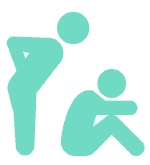 Whether from internal or external sources, hearing should is reminiscent of being scolded and lectured to as a child.
Whether from internal or external sources, hearing should is reminiscent of being scolded and lectured to as a child.
Similar to when you were a child, shoulds imply you have no choice or control in a situation.
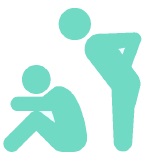 The same disempowerment we felt as children can reappear when faced with should as an adult. If we feel like we are being treated as a child, we may start acting like a child.
The same disempowerment we felt as children can reappear when faced with should as an adult. If we feel like we are being treated as a child, we may start acting like a child.
These child-like feelings can lead to child-like reactions.
Reacting in situations instead of responding thoughtfully, may have negative implications.
These actions and reactions can keep you in a disempowered cycle and prevent you from moving forward.
Reinforcing the Negative
Should reinforces the negative aspects of a decision and keeps you focused on the past.
When you look back on a decision or choice and say “I should have done this” or “I shouldn’t have done that,” you are focusing on what went wrong.
By keeping your focus on the negative instead of looking at how the choice has helped and supported you, you create a disempowering cycle. 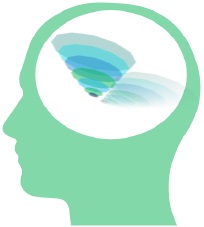 While there is value in learning from previous actions, using should to do so, brings along judgements, expectations, obligations, and guilt.
While there is value in learning from previous actions, using should to do so, brings along judgements, expectations, obligations, and guilt.
This dwelling on the negative is harmful and can become rooted in our mind.
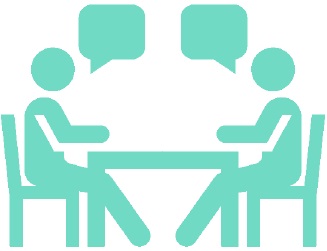 Influencing our relationships
Influencing our relationships
Should impacts our relationships with both ourselves and others.
Although shoulds may be veiled as well-intentioned advice, when we place should on to others, we are judging them against our own standards, values, and beliefs.
By telling others what they should or shouldn’t be doing, we assume our own superiority.
There is the assumption that we know better, and are better, than the other person. This type of interaction impacts how we are perceived and directly influences our relationships.
04 Weeding Out Should
+Case Study
+Values and Beliefs
+Shifting Perspectives
…when we dwell on our shortcomings and failings, we’re less likely to look for and identify solutions and next steps…the phrase “next time, I will…” can help keep us relentlessly solution-focused. Noa Kageyama, PhD. bulletproofmusician.com
Case Study
Amanda came to a coaching session wanting support in finding motivation to keep a clean home. She dreaded cleaning and felt guilty for not keeping her home tidy.
Although she felt guilty, it wasn’t enough to actually compel her to clean her house. She wanted to find her motivation to start, and complete, this chore.
When asked what was preventing her from keeping a clean home, Amanda revealed a tidy home was not truly a priority for her. Amanda thought as an adult, she should have a tidy house. This should represented the expectation and obligation she felt, which manifested as guilt when she did not complete the task.
Through further exploration with her coach, Amanda realized that she cleaned her home when friends and family were scheduled to visit. To her surprise, it wasn’t the perceived judgement of others that moved her to clean, but her values around hospitality and welcoming people into her home.
This discovery helped Amanda shift her perspective around cleaning from the dread and guilt, based on should, to more positive feelings based on her value of hospitality.
Values and Beliefs
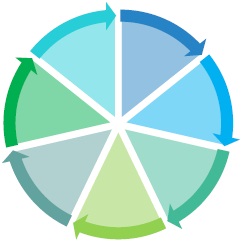 To weed out, or remove, should from your inner dialogue you need to examine your true values and beliefs.
To weed out, or remove, should from your inner dialogue you need to examine your true values and beliefs.
It is important to dig deeper to discover what’s beneath the should.
It is when you get to the root and underlying issues surrounding should, that you can start to remove it from your life.
Shoulds often present themselves internally when your actions do not align with your values or beliefs.
This misalignment leads to self-doubt and to dishonesty about what you really want.
When your actions are in alignment with your values, shoulds will transform into “I will do this” “I want to do that.”
Shifting perspectives
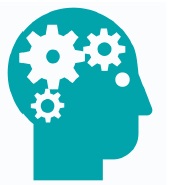 If you are having difficulties weeding out should from your life, try to switch your vocabulary around the issue.
If you are having difficulties weeding out should from your life, try to switch your vocabulary around the issue.
The seemingly simple act of changing should to will may help you determine if the potential action is aligned with your values. This change can also increase your commitment to the action.
Another way to help shift your perspective and remove should from your life, is to think of them as coulds.
Coulds are interpreted as options and possibilities. Instead of internalizing a should into a must, if you interpret the should as just one of many possible choices in a given scenario.
When shoulds are persistent, use the benefits of the activity or decision to help transform how you think about it.
You need to be diligent when weeding the shoulds out of your life. They have a way of reappearing and taking root when you are not looking.
Create some consciousness around the word ‘should’, don’t let it hold you back or act as an excuse for what you really WANT or NEED to do. Em Maidment Greenpress.com
References
